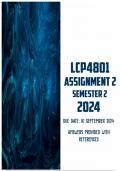, PLEASE USE THIS DOCUMENT AS A GUIDE TO ANSWER YOUR ASSIGNMENT
Please note that the author of this document will not responsibility for any plagiarizing you
commit.
Question 1
1. On 3 April 2020, the Republic of Airoterp entered the territory of the Republic of Aibmaz,
without authorisation, and killed Diaprem in his home. The government of Airoterp claims that
Diaprem is a terrorist who had carried out a series of bombings that killed over 100 people
within its territory. From reports, Diaprem was unarmed when he was shot and killed by
members of the Airoterp special forces. Evaluate the actions of the Republic of Airoterp based
on the questions below with reference to authority.
1.1. Briefly State the position of international law regarding the use of force.
Prohibition of the Use of Force:
Under international law, the use of force by states is generally prohibited. This principle is enshrined
in Article 2(4) of the United Nations Charter, which states:
“All Members shall refrain in their international relations from the threat or use of force against
the territorial integrity or political independence of any state, or in any other manner inconsistent
with the Purposes of the United Nations"
This prohibition is considered a cornerstone of the international legal order, aimed at maintaining
international peace and security.
Exceptions to the Prohibition:
There are only a few exceptions to this general prohibition:
Self-Defense: Article 51 of the UN Charter recognizes the inherent right of individual or
collective self-defense if an armed attack occurs against a Member of the United Nations, until
the Security Council has taken measures necessary to maintain international peace and security.
Authorization by the UN Security Council: Under Chapter VII of the UN Charter, the
Security Council can take measures, including the use of force, to restore international peace
and security if it determines the existence of any threat to the peace, breach of the peace, or act
of aggression.
Customary International Law:
The prohibition on the use of force and its exceptions are also reflected in customary international
law. These norms have been reiterated in various international treaties, court decisions, and state
practices, affirming their binding nature beyond the UN Charter.




